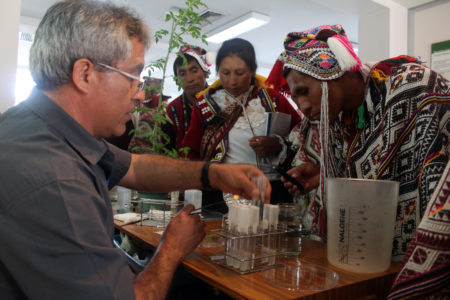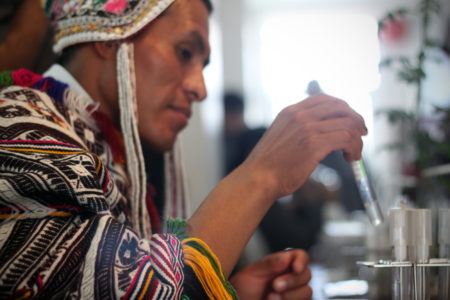Indigenous Peoples’ Day Highlights Centuries of Know-How
International Day of the World’s Indigenous Peoples – observed since 1995 on August 9 – commemorates the rights, contributions and cultures of indigenous populations around the globe.
Defined as the original people to dwell in land colonized by outsiders, indigenous peoples possess priceless knowledge and deploy ancient practices whose relevance in the face of climate change is more crucial than ever, notes Selim Guvener, CIP’s head legal counsel.
“Smallholder farmers are often subsistence farmers with very limited access to market for obtaining agricultural inputs on the one hand, and selling their produce on the other,” he said. Interestingly, “it is this isolation from a global market that makes their traditional knowledge so valuable.”
Capturing, protecting and disseminating this knowledge informs the work of CIP at multiple levels, he added.
“This traditional knowledge is often unknown by science and complements the scientific knowledge brought along by CIP scientists,” he said. “This is where the smallholder farmer, in addition to being our primary beneficiary, also becomes our scientific partner.”
Farmers and scientists work side by side in fields and in labs to correlate traditional knowledge and scientific research in order to better understand the interaction between crops and agro-ecologies. In the course of this work, the practices’ roles in shaping farming communities’ social, cultural and economic well-being is better understood.
Looking across regions and countries, one might be surprised to see a substantial amount of overlap.
“Traditional practices cut across geo-political boundaries,” Guvener said. “My personal opinion is that it is often the agro-ecology and cultural identities that define commonality of traditional knowledge and practices.”
Guvener added that as younger generations move away from the farmland to cities for school and work, the risk of erosion of traditional knowledge is heightened. Yet as a conscious effort is made to document the practices, “conservation and transmission to future generations becomes more probable.”
 Preserving and protecting traditional knowledge depends largely on the state of the legal system in a given nation, Guvener said.
Preserving and protecting traditional knowledge depends largely on the state of the legal system in a given nation, Guvener said.
“As an international research organization, [CIP’s] primary concern is to respect existing national and international norms and go beyond them by learning, applying and setting by example the best practices for promoting the right and ability of traditional communities to control, share and benefit from the use of their traditional knowledge,” Guvener explained.
Among many successful examples: CIP’s longstanding relationship with Peru’s Parque de la Papa and the Chirapaq-Nam initiative, both of which can be read about at www.cipotato.org.
The theme of this year’s International Day of the World’s Indigenous Peoples is the Right to Education. To learn more, visit http://www.un.org/en/events/indigenousday/.
